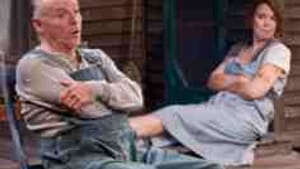Stay in the Loop
BSR publishes on a weekly schedule, with an email newsletter every Wednesday and Thursday morning. There’s no paywall, and subscribing is always free.
The poetry of unheeded expectations
"Moon for the Misbegotten' at the Arden (3rd review)

There is no greater vehicle devised in language to better examine the inner adjournments of the mind than poetry, and Eugene O'Neill and Tennessee Williams are the premier poets of the American theater.
Both O'Neill and Williams wrote dramas that suffer and triumph because of their poetic language, and many times suffering and triumph alike transpire within a single play.
The characters and plot of A Moon for the Misbegotten are difficult to fathom and understand. This play is hard on one's psyche, probably because most theatergoers harbor corners of denial and desperation that they'd prefer not to confront. Each character's mental state teeters on the brink of psychosis, and the language abets their condition.
If it's sunny entertainment you seek, see Brigadoon.
Moon for the Misbegotten is a silent salient tale of unrequited love and unattainable forgiveness for the soul. It's set on a tenant farm in Connecticut in 1923, which is in walking distance to a trolley line and a "tavern" (speakeasy), two obvious forms of escape. The squalor of the farm reflects the desperation of its inheritor's character.
The heir to these surroundings is the distressed James Tyrone, Jr., a drinking buddy of his roustabout tenant Phil Hogan as well as the drunken admirer of Phil's strong-willed daughter, Josie.
Shirking stereotypes
In the opening scene, at the end of the day, the last of Phil's three sons (Mike) prepares for escape from the Hogan pig farm. The quarreling between the fancy gentleman farmer neighbor and Hogan because Phil's pigs are wallowing in the neighbors' icehouse is a mere example of O'Neill's literary workmanship. In the hands of a lesser writer, this subplot would fall back on crass stereotyping. But with O'Neil these associations showcase his wry sense of humor.
Josie, as she assists her brother with his escape, is warned not to take Tyrone's promise to sell the farm to their father seriously, as he has had better offers for it. Josie feigns disbelief that James would do such a thing, but her self-doubts cause her worry nevertheless.
Josie's nervousness is fueled by her secret love for Tyrone, his indifference toward her and her inward hatred of herself. It's the perfect trinity for despair.
James's despair is sparked by alcohol, but as the late day leads into the late night, we get a deeper glimpse of the reason for his hopelessness.
Symphonic performance
In this drama about unheeded expectations and unanswered forgiveness, the execution of O'Neill's lines demand perfection from the cast. This is where the talents and reputation of the seasoned ensemble at the Arden are most appreciated.
Grace Gonglewski (as Josie Hogan), Eric Hissom (James) and M. Michael Walls (Phil) play their parts as perfectly executed as a symphony orchestra. Sean Lally (Mike Hogan) and Allen Radway (as T. Stedman Harder, the Standard Oil gentleman farmer neighbor) are commanding presences. Under the direction of Matt Pfeiffer, the ethereal effect of this virtual symphony of poetry is both bone chilling and rapacious.
Think of Port Richmond
The ladies who sat behind me kept fretting about poverty and Connecticut. The set by Matt Saunders (done in the classic tenement farmhouse style) depressed them (it was perfect). Why, one asked, would a Standard Oil heir live next door to a tenant farm? Why would a scholar and a gentleman (albeit a drunken one) befriend the likes of the Hogans?
To assuage their spirits I asked them to imagine that these scenes took place in a changing Philadelphia neighborhood, like the pocket up in Port Richmond— where people who have lived on the edge of their wits for a long time now live next to new neighbors who have fled their Center City demons and are turning old homesteads into million-dollar homes.
Poverty is all around us, ladies. And most of it has nothing to do with the absence of money.♦
To read another review by Robert Zaller, click here.
To read another review by Alaina Mabaso, click here.
Both O'Neill and Williams wrote dramas that suffer and triumph because of their poetic language, and many times suffering and triumph alike transpire within a single play.
The characters and plot of A Moon for the Misbegotten are difficult to fathom and understand. This play is hard on one's psyche, probably because most theatergoers harbor corners of denial and desperation that they'd prefer not to confront. Each character's mental state teeters on the brink of psychosis, and the language abets their condition.
If it's sunny entertainment you seek, see Brigadoon.
Moon for the Misbegotten is a silent salient tale of unrequited love and unattainable forgiveness for the soul. It's set on a tenant farm in Connecticut in 1923, which is in walking distance to a trolley line and a "tavern" (speakeasy), two obvious forms of escape. The squalor of the farm reflects the desperation of its inheritor's character.
The heir to these surroundings is the distressed James Tyrone, Jr., a drinking buddy of his roustabout tenant Phil Hogan as well as the drunken admirer of Phil's strong-willed daughter, Josie.
Shirking stereotypes
In the opening scene, at the end of the day, the last of Phil's three sons (Mike) prepares for escape from the Hogan pig farm. The quarreling between the fancy gentleman farmer neighbor and Hogan because Phil's pigs are wallowing in the neighbors' icehouse is a mere example of O'Neill's literary workmanship. In the hands of a lesser writer, this subplot would fall back on crass stereotyping. But with O'Neil these associations showcase his wry sense of humor.
Josie, as she assists her brother with his escape, is warned not to take Tyrone's promise to sell the farm to their father seriously, as he has had better offers for it. Josie feigns disbelief that James would do such a thing, but her self-doubts cause her worry nevertheless.
Josie's nervousness is fueled by her secret love for Tyrone, his indifference toward her and her inward hatred of herself. It's the perfect trinity for despair.
James's despair is sparked by alcohol, but as the late day leads into the late night, we get a deeper glimpse of the reason for his hopelessness.
Symphonic performance
In this drama about unheeded expectations and unanswered forgiveness, the execution of O'Neill's lines demand perfection from the cast. This is where the talents and reputation of the seasoned ensemble at the Arden are most appreciated.
Grace Gonglewski (as Josie Hogan), Eric Hissom (James) and M. Michael Walls (Phil) play their parts as perfectly executed as a symphony orchestra. Sean Lally (Mike Hogan) and Allen Radway (as T. Stedman Harder, the Standard Oil gentleman farmer neighbor) are commanding presences. Under the direction of Matt Pfeiffer, the ethereal effect of this virtual symphony of poetry is both bone chilling and rapacious.
Think of Port Richmond
The ladies who sat behind me kept fretting about poverty and Connecticut. The set by Matt Saunders (done in the classic tenement farmhouse style) depressed them (it was perfect). Why, one asked, would a Standard Oil heir live next door to a tenant farm? Why would a scholar and a gentleman (albeit a drunken one) befriend the likes of the Hogans?
To assuage their spirits I asked them to imagine that these scenes took place in a changing Philadelphia neighborhood, like the pocket up in Port Richmond— where people who have lived on the edge of their wits for a long time now live next to new neighbors who have fled their Center City demons and are turning old homesteads into million-dollar homes.
Poverty is all around us, ladies. And most of it has nothing to do with the absence of money.♦
To read another review by Robert Zaller, click here.
To read another review by Alaina Mabaso, click here.
What, When, Where
A Moon for the Misbegotten. By Eugene O’Neill; Matt Pfeiffer directed. Through February 27, 2011 the Arden Theatre, 40 N. Second St. (215) 922-1122 or www.ardentheatre.org.
Sign up for our newsletter
All of the week's new articles, all in one place. Sign up for the free weekly BSR newsletters, and don't miss a conversation.

 Jackie Schifalacqua
Jackie Schifalacqua